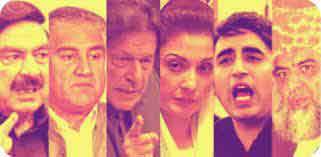Peshawar - Being considered a popular form of government in the world, democracy derives its strength from the masses, who had a strong say in policies and decision-making of governments while accepting each other’s criticism for bringing about improvement in the system. Therefore, democracy is more than just a set of government institutions as it largely depends on political tolerance, values, mindset, practices and norms inevitable for socioeconomic growth and human development. It is rightly said by the former US President Abraham Lincoln, “democracy is the government of the people, by the people, and for the people.” Talking to APP, Professor Dr A H Hilali, former Chairman, Political Science Department, University of Peshawar said that in democracy, people elect their representatives to govern them through a parliamentary form of government for five years and take decisions for their well-being. In the ancient times, he said many forms of governments’ including monarchy, aristocracy, colonialism and dictatorship were practiced in the world but all these systems were gradually replaced following the introduction of democratic form of government in ancient Greece. Dr Hilali said the notion of democracy is basically stemmed after the treaty of Westphalia (1648) and it became socially more favourable after the French Revolution in 1789, adding that political philosophers like Rousseau also advocated about democracy as the most justifiable form of government to address the people’s issues based on political tolerance and acceptability of each others’ mandates. He said until the mid-20th-century, democracy did not achieve smooth sailing and had to compete with the challenges of nazims, fascism and totalitarianism till the end of the World War II. Eventually, after 1945, the norms of democracy became more famous across the world including the Subcontinent. He said democracy had also introduced in Pakistan and India after achieving independence from British in August 1947, however, this system could not flourish in the former due to unavailability of constitution and untimely deaths of the father of the nation and first Governor General of Pakistan, Quaid-i-Azam Muhammad Ali Jinnah on September 11, 1948 and first Prime Minister of Pakistan, Nawabzada Liauqat Ali Khan on October 16, 1951. Prof Hilali said democracy was derailed several times in the country after political parties did not accept each other’s’ mandates due to political intolerance and agitation by overthrowing political governments. He said, “Pakistan has a long history of political intolerance where losing parties and candidates levelled serious rigging elections against winners which either led to premature dissolution of the national and provincial assemblies or midterm election besides derailment of democracy four times.” He recalled that the government of former prime minister Zulfiqar Ali Bhutto was overthrown after the nine religious- political parties of the joint opposition from the platform of Pakistan National Alliance (PNA) had launched mass agitation movement due to political intolerance besides claiming electoral fraud and riggings allegations during the general elections of March 7, 1977. “The PNA had started agitation movement after it bagged only 36 seats and PPP secured landslide victory with 155 seats,” he said, adding that one seat was won by the PML (Qayyum) and eight seats were clinched by the independent candidates in the total 200 seats of the Parliament during 1977 general elections. In spite of strong denial of the rigging allegations by the PPP, he said, the PNA’s agitation movement sparked riots and unrest in the country after massive demonstrations and violent anti-Bhutto protests. As a result of political intolerance, he said the elected governments of PPP and PML-N had been dismissed on allegations of corruption, poor governance, mismanagement and rigging elections during 1988- 1999 and its negative outcome emerged before us as of October 12, 1999 martial law
Saturday, April 20, 2024
Political tolerance vital to flourish democracy in country

Pak economy improving, funds will be provided on request: IMF
9:57 PM | April 19, 2024
Minister advocates for IT growth with public-private collaboration
9:57 PM | April 19, 2024
Judges' letter: IHC seeks suggestions from all judges
9:55 PM | April 19, 2024
Formula 1 returns to China for Round 5
9:05 PM | April 19, 2024
Germany head coach Julian Nagelsmann extends contract till 2026 World Cup
9:00 PM | April 19, 2024
A Tense Neighbourhood
April 19, 2024
Dubai Underwater
April 19, 2024
X Debate Continues
April 19, 2024
Hepatitis Challenge
April 18, 2024
IMF Predictions
April 18, 2024
Kite tragedy
April 19, 2024
Discipline dilemma
April 19, 2024
Urgent plea
April 19, 2024
Justice denied
April 18, 2024
AI dilemmas unveiled
April 18, 2024
ePaper - Nawaiwaqt
Advertisement
Nawaiwaqt Group | Copyright © 2024





